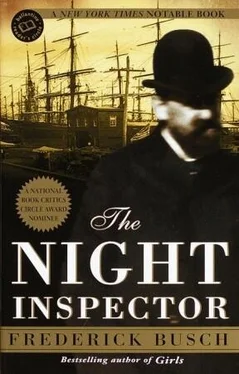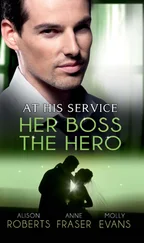He nodded his long neck, his bony head. “A good deal of it I do. I do.”
“Good. You sound married to my proposal,” I said.
He nodded again, this time silently, as he rubbed at his face with his knuckly, long fingers.
“The paperwork,” I said.
“Agreed. Do I need to shake your hand?”
I smiled. He could not see me. I stood and said, “Within the week, then?”
“Today,” he said. “Tomorrow. As you wish.”
“The money shortly thereafter?”
“That’s as I can.”
“It’s as I say.”
“The money thereafter. Rest assured.”
“Yes, Lapham.”
He wiped at his face with his handkerchief, and I left before he blew his nose.
Someone was hurting a child, though it might have been a woman I heard — perhaps a small woman, I thought. Over the noises of the city’s dawn, as wagons slowly rolled on wheels that splintered upon the cobbles under the burden of hides, beef halves, dead poultry buried in ice, fresh flowers for the breakfast tables of the wealthy, or the furniture from households in arrears, I heard the steady cry of someone small, with a high voice, being hurt. It was remarkably regular, and soon enough it became one of the many sounds — you could even hear the doves coo, and the scolding by dirty sparrows — that constituted the calling awake of those who knew how to sleep.
Oh and Oh and Oh .
No, I thought: a child. I could not discern whether it was a response to hard blows, or the prodding of some instrument — fire poker, knife, the buckle of a belt — but it was regular and forceful, for the sounds were clearly part of an expulsion of breath, a response to a shock.
An engine at the New York and Harlem freight depot on White Street gave out a huffy demand, and I waited for the clash of metal that would signal cars being joined or pulled separate. I kept my eyes closed and kept my arms crossed as I lay on the cot. I thought of Malcolm lying in his uniform, sword at his side and apparently not armed for his journey with my revolver. It was an investment, but I would not mind its return. It had traveled with me, after all, up and down several states along our seaboard. It had saved my life and it had cost the lives of others. Seamen and their scrimshaw and clasp knives and trunks: shooters and their weapons.
The crying had grown ragged, the noises breaking into pieces as the one who uttered them also must break. Oh-uh, Oh-uh . One of the manufactories shrieked its whistle to signal in the workers for the day. Now it was Uh and then a silence, then Uh . Whoever administered the punishment was growing tired, I thought, and was pausing between blows. Of course, it was also possible the child was dying. As the small noise among a hundred loud ones became more and more noticeable for its absence, I thought: unconscious or dead. I thought: That’s a nice bit of luck for someone.
Then I thought of Uncle Sidney Cowper, who would let me choose which of us, my mother or I, would be snug harbor to his needs. It was at this time in my life that I dreamed of his notebook and found it in the woodpile and thought to incur his obligation by returning it. I learned something about transactions, and it has stood me in good stead all my life: Know the rules; do not trade with hope, but rather, if possible, with advantage harvested and, like the fruits in glass my mother stored every summer, put by for a need. To wit: I should have read his entries and labored to decipher their use by me to keep him off us. Instead, I ambled and prattled and offered and smiled. He thanked me, but the violence with which he pulled the leather notebook from my outstretched hand instructed me that I had just let go of something useful. A resource is to be cherished: William Bartholomew on M. And watch it now come to fruit.
I went to college at fifteen, thanks to Uncle Sidney Cowper, and was glad to go at that age in order to escape him. I was alert and lonely and wretched, and I found difficulty in enjoying my few triumphs — the company of Melanie Levi, the daughter of a baker in New Haven who taught me French, both language and deed; my ability to tell my instructors what they wished to hear — because I thought, whether in the icy solitude of my small room or in the company of my pimpled, braying classmates, of Uncle Sidney Cowper atop my mother. And the more I learned from Melanie, the more my cauchemars grew detailed and more prurient, more fascinating and therefore more frightening. Soon, I frightened myself, for the vision of him tupping her was the least of my awful constructions. I did not know whom I blamed the more, my predatory uncle or myself, who chose to leave my mother in his hands.
It is the door, I told myself.
I had wakened to the sound of my panting, to the sound of my voice going Oh and Oh . It is someone at the door, I told myself, as if to calm a child.
I kept the discarded cracked haft of a street worker’s shovel as a life preserver, which I leaned against the wall beside the door. Squinting against the day’s light that filtered into my room, I seized the oak shaft and unlocked my door.
He made an inarticulated noise, a cry of fright and pity. I felt my hand go up to cover what I could of my face, for his sake and mine. I backed away, cursing like a wrangler of horses for my having gone to the door in such a daze of nightmare and fatigue that I forgot to don my mask. I kept the haft in my hand as I grasped for the mask.
“Wait,” I warned him. “Wait at the door.”
Then, covered, I turned to him again and found him in the doorway, his own hand at his face as if to imitate me of seconds before. “Billy,” he said in a familiar voice. “Billy, I’m so sorry.”
His hair was a wiry dark halo. I said, “Sam Mordecai. Now it’s all right. You can look now.”
He slowly dropped his arm, too long for the brown serge sleeve of his suit coat, and he slowly opened his eyes. “No,” he said, closing them again, “no, it isn’t all right.” He took a breath and opened his eyes. “How it must have hurt beneath those bandages. How terrible, Billy.”
“I dreamed about you,” I said. “And here you are. I read your coverage of the suicide. In Boston?”
He nodded.
“And your memoir of the War?”
“I’m learning patience,” he said.
I beckoned him in and pulled a chair to. He obediently sat. “You’ll pardon the nightshirt,” I said, “but I rise late and go late to my bed. You’ll wait while I dress? And tell me, as I do, how you found me.”
He had lost a good deal of weight and his face seemed longer, boyish still but also more muscled and more worked upon; as I knew, he had seen a great deal in the War. His dark, liquid eyes were not still.
“I found you by wandering about and saying your name and pointing to my face,” he said, licking his lips and crossing and recrossing his arms. His energy was aboil. I thought him too uncontemplative, too keenly physical, to be a writer, and I thought it a piece of good luck because I wished him well. “I remembered your vow to become wealthy, so I asked questions of men in banks and at the gaming rooms on Broadway and at the Exchange. At each, you were known. No one knew where you lived, however.” He took from his breast pocket a slender notebook in black leather, and he fanned through pages to find his notes. “Assuming, then, that you wished to be lost, I thought to discern what woods you would take to, in lying low. It was always your way. You always went for the thickets, the brambles at the bottom or the topmost parts of the leafiest trees. You were always, I realized, in hiding. Never did I think of you behind a mask, but even that makes sense.”
“Sam, you needn’t trouble yourself to make sense of me. I prefer, in fact, not to be made sense of.” I was struck by a consideration: “Sam, you haven’t hunted me down to put me in your book?”
Читать дальше












